Share
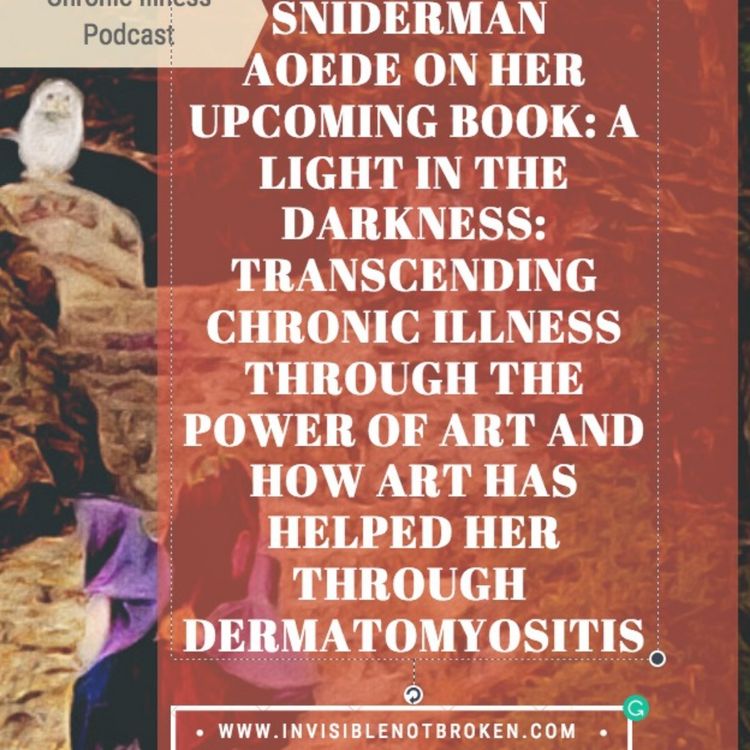
Invisible Not Broken - Chronic Illness Podcast Network
Interview with Lisa Sniderman on her book: A LIGHT IN THE DARKNESS: TRANSCENDING CHRONIC ILLNESS THROUGH THE POWER OF ART DERMATOMYOSITIS
Buy A Light in the Darkness: Transcending Chronic Illness Through the Power of Art
I got an up close look at an amazing woman, Lisa Sniderman, Aoede, with an interview about her upcoming book A Light in the Darkness: Transcending Chronic Illness Through the Power of Art and her chronic illness Dermatomyositis. She is full of fairy sparkle and creativity. Just listening to her made me feel so inspired. We talk a lot about what it means to be chronically ill and disabled as an artist. In many ways, it is a tremendous escape to use art as a therapy when dealing with chronic pain. We go over some real ways, tools, and apps that can help you explore new art forms.
Name *
Lisa Sniderman
What is your disorder? *
Dermatomyositis (DM)-a rare autoimmune progressive muscle weakness disease, which attacks and weakens my immune system, muscles and skin as well as my mind and spirit, and if left untreated, could result in complete muscle wasting and long-term disability, as well as other complications.
At what age did your disorder become a daily issue? *
36
Who were you before your illness became debilitating? *
An Environmental Scientist and Singer-Songwriter-and ME-someone on go go go like that energizer bunny-hopping from activity to activity and never stopping until my body forced me to! Like when I was diagnosed: I was getting married in 6 weeks, I was prepping for a Northwest Tour and releasing my first full-length album, and planning a huge environmental workshop, and taking lapidary and songwriting classes, all at the same time.
What would you do if you were not dealing with your invisible illness? *
Still be on my path to fostering healing and doing expressive and teaching arts-just wouldn't have to do it WHILE battling my DM-and maybe I would be packing more into my days..
What would you like people to know about your daily life? *
I am NOT my disease. I spend my days in my place of joy-creating, expressing, or sharing my art and music-mostly from home so that I do not have to focus on the illness, the disease, the darkness, the doctor appointments, the things I can no longer do. It doesn't mean I don't struggle daily with weakness, get tired easily, have little stamina and energy when out in the world. It means I must choose my specific activities each day so I can make sure I have the energy for those things that DO bring me or others joy, and rest if I am going to do a big activity. I feel blessed to choose how to spend my days. I feel grateful that I am able to rest when I need to. Some days, I feel isolated from the world, but when I am out, I don't take my surroundings or my activities for granted. I treasure and try to be aware of living in each moment. I am so fortunate to have an amazing husband and supportive family and friends, and the sweetest fox terrier Alice, (I feel like I'm HER support animal!) so I don't go it alone.
What would make living and moving in the world easier for you? *
If I had more stamina and strength! Otherwise, I use my cane when I am out, and bring my walker if it is a longer distance. I use uber or lyft to get around, so I don't constantly have to rely on my husband and can feel more independent. Also, MORE CHAIRS when I am in stores! OMG I feel like I have to walk and walk and if I only have my cane, I tire easily-but no chair!
Do you have any life hacks? *
Sure! https://ourheartspeaks.org/wp-content/uploads/2018/07/Life-Lessons.pdf
What kind of support do you get from family or friends? *
I am blessed! I have surrounded myself with loving supportive family and friends during the hardest darkest moments, I learned that not everyone deals with sickness or caring for a sick person the same. I learned who stuck by me. Now that I have been living with chronic illness for 10 years, I find that most of friends get that I have limitations but don't really need to know the details of what it is like for me to go through my day to day dealing with DM. My husband is a saint and a rock. I swear I wouldn't be here let alone the person I am today without him as a true partner by my side. I love that he believes me, wants me to rest, gets that I have limitations and wants to care for me. I know how rare that is.
Have you ever had someone not believe you have an invisible illness because of your appearance and if so are there any examples that stand out? *
Not believe-but more like, WOW you look great! I'm so glad to see you feeling well! Or you look amazing-therefore you must feel well!
How has your invisible illness affected your relationships? *
Yes in that I no longer drive (I haven't since 2010) nor do I have a lot of stamina for being out in the world. That means that people who want to stay in my life often do it on my terms-e.g., come to me rather than me going to them. I am able to do more now, but that has been the case for many years. People who are close to me accommodate. Same with my crazy restricted diet-I've been gluten, sugar, and dairy free for 10 years! Another example, my Producer and I were working on a full-length fantasy musical audiobook. He lives in LA, but drove up to my house in SF Bay Area so we could work together because he knew it would be less taxing on me. Also, with my husband! I was diagnosed 6 weeks before we got married! So for all of our married life, it has been caretaker-patient relationship-especially when I flared in 2010 and had to spend a month in the hospital due to complete muscle weakness and then months of grueling rehab to regain my strength, relearn to sit up, stand, walk, sing and play. It has affected every relationship I have I suppose!
Is there anything you are afraid to tell people in your life? *
At times, especially because I’m almost always home, I feel like I’m hiding from the world, playing it safe indoors. Maybe that’s why I create light characters, focus on fantasy, and want to connect with my inner child. As I’ve taken on my artist-Aoede the Muse’s identity, inspiring others, I’m disinclined to share the scary, icky, fearful, sad, negative feelings—the secret spaces where I’ve stuffed my skeletons. I tell myself I have to put on a smile and be upbeat, not show weakness or have self-doubt. It’s much easier to tell the world that all is beautiful than to admit that living with a chronic illness is harder than anything I’ve ever faced; that some days it’s exhausting to get out of bed, despite my positive attitude and optimism; that I get tired of thinking and talking about being sick, and just plain being sick; that the endless therapies, drug cocktails, and unwanted side effects keep me on a roller coaster; that I resent having precious moments of my life replaced with 156 doctors’ appointments; that I wish I had more stamina for being in the world; that I wonder where David’s and my relationship would be had I never gotten sick—if he didn’t have to do all the shopping, cleaning, cooking, and driving, and we had an equal partnership instead of a caretaker- patient relationship.
Does the fact that your disease is invisible change how healthcare professionals treat you? *
I have had the same rheumatologist up until Oct 2017-so I felt fortunate and listened to...
What is your best coping mechanism? *
creating arts and music! (e.g., expressive arts-creating, recording, performing songs; creating and recording full-length musicals on audiobooks and adapting them to musical theater stage plays; sharing my story, writing and releasing my memoir; collaborating with 50 artists who use creativity to heal to share their stories; helping others navigate their personal darkness; being a teaching artist
What are you the most concerned about and the hopeful for in the future? *
Concern-that I will stay here at this place and this will be my best quality of life that I won't be able to get off the treatment-that there is no remission or cure-only manage and get the best quality of life I can; that I will flare and have setbacks and revert to the shell of a person I was in 2010 in the hospital and not have the enthusiasm and physical ability to sing, to play, to create; that I never know when I am doing too much until it is too late. I fear the unknown, particularly loss or change in security, support, and safety. In a worst-case scenario, being forced to work to maintain financial security could further stress my body, make my DM flare up, and land me back in the hospital, undoing years of recovery. I imagine losing my support, my gift of time, and my ability to live in my place of joy and focus on my art each day. I worry that I could change as a person— that I could lose my drive, my passions, my heart, and my spirit and have no room or interest to chase or follow my dreams if I were constantly stressed and concerned about making ends meet or getting sicker. I think of the negative impact such losses could have on my relationships with David and other family members, friends, and even fans. I can’t help but wonder if I even fear success because of what it might cost me. Hopes: I am managing for now! I am living in my place of joy so that is the best place I could be. I am hopeful I will continue to have the best quality of life I can. I am hopeful my energy, strength and stamina will improve over time. I am hopeful I will be able to travel, stay out in the world for longer, do activities that make me feel a sense of normalcy. I know I will continue to create to help me and others heal. Also, that there is a CURE for myositis in the future and better diagnosing so others (especially the kids juvenile myositis) don't have to suffer!
What is your favorite swear word?
HA! probably ass
Is there anything you want to make sure we talk about during the interview? Like an organization you want to promote or something specific that you deal with.
Love to make sure we talk about: my upcoming memoir: "A Light in the Darkness-Transcending Chronic Illness through the Power of Art and Attitude" Sep 21 publish date-and Myositis Awareness Day; and Lights in the Darkness-my collaboration with more than 50 artists who are using creativity to help heal to share stories of art and healing-live/streaming event in December 2018. Perhaps also success-what does it mean how has it changed etc. bc there are so many ways to think about success besides financial it is important to attract abundance into your life.
What is the hardest and/or best lesson your condition has taught you?
When life throws us curveballs; when we’ve lost our inspiration because of a significant change in health status, and when we live day in and day out with a chronic disease or disability, it’s tempting to want to give up our dreams, to play the victim. It’s easy to succumb to discouragement, self-pity, or even despair. But dreams and significant health challenges aren’t mutually exclusive. I’m a living example. We can live with hope, passion, and joy, even if the shape and substance of our dreams have changed. We can live well with chronic illness!
What is the best purchase under $100 that helped your life
My unique cane! It is twisted wood and multi-colored and so fits my bright, quirky brand and personality!
More episodes
View all episodes
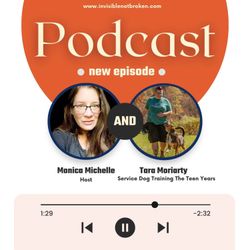
Disability & Dogs: Mastering Service Dog Puppy Training - Teenage Years, Fear Periods & Trauma : Tara Moriarty
38:57|SummaryIn this conversation, the speakers discuss various aspects of puppy training, particularly focusing on the challenges of training service dogs. They delve into the teenage phase of puppies, the fear periods that can arise during development, and how to manage trauma in service dogs after negative encounters with other dogs. The conversation emphasizes the importance of proper training techniques, socialization, and the need for vigilance in public spaces to ensure the safety and well-being of service dogs. This conversation delves into the essential aspects of training service dogs, focusing on foundational skills, assessment programs, handling emergencies, and navigating the challenges of training during a dog's teenage phase. The speakers discuss the importance of confidence in dogs, the differences between CGC and PDA programs, and practical advice for trainers, especially those with disabilities. They also touch on the timing of neutering and its impact on behavior, emphasizing a tailored approach to each dog's training journey.Keywordspuppy training, service dogs, fear periods, dog behavior, trauma recovery, dog interactions, training tips, service dog management, puppy adolescence, dog anxiety, service dog training, dog behavior, training techniques, mobility aids, dog assessment programs, emergency handling, teenage dog training, neutering debate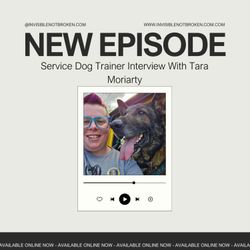
Choosing Your Service Dog With Tara Moriarty
01:07:07|SummaryIn this conversation, the speakers discuss the complexities of choosing and training service dogs versus puppies, emphasizing the importance of temperament, the challenges of finding suitable dogs, and the training process. They share personal experiences and insights on navigating the world of service animals, including the significance of socialization and public perception. In this conversation, the speakers discuss various aspects of puppy training, focusing on capturing natural behaviors, creating a conducive learning environment, and the importance of crate training. They also touch on navigating dog parks, the need for services for disabled dog owners, establishing routines, and essential commands for service dogs. The conversation emphasizes the significance of understanding puppy development and the challenges that come with training during different growth stages.Keywordsservice dogs, puppies, training, temperament, challenges, public perception, potty training, socialization, choosing a dog, service dog training, puppy training, dog behavior, crate training, service dogs, dog parks, routines, commands, dog owner services, puppy development, positive reinforcement
Author Interview Jess Graham : Childhood Invisible Illness. Service Dogs, Writing a Book, and what about God?
58:24|SummaryIn this conversation, Jess shares their journey of writing the book 'Being Sick Enough', which explores themes of invisible illness, childhood trauma, and the complexities of living with chronic conditions. The discussion delves into the challenges faced as a sick child, the misunderstandings surrounding invisible illnesses, and the process of writing personal stories while navigating relationships and self-acceptance. In this conversation, the speakers delve into the complexities of navigating trauma, the importance of meditation, and the intersection of medication and wellness. They discuss the significance of honest conversations about medication, the balance between solitude and community, and the role of spirituality in personal healing. The dialogue also touches on societal challenges and the need for empathy, as well as practical travel tips for those with chronic illness.Keywordsinvisible illness, chronic illness, trauma, writing, personal stories, mental health, self-acceptance, authenticity, healing, Jess, trauma, meditation, wellness, medication, spirituality, empathy, chronic illness, travel tips, community, solitude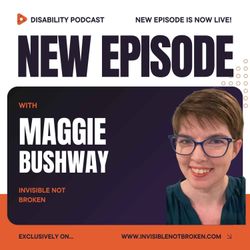
Author Interview Maggie Bushway: Memoir writing, Advice for Parents, and the Joys of a Weighted Blanket
36:25|SummaryIn this conversation, Maggie Bushway shares her experiences as a child with brain cancer and the impact it had on her life, family, and friendships. She discusses the importance of autonomy in medical decisions, the role of writing in processing emotions, and the challenges of managing chronic illness while pursuing her passion for writing. The conversation also touches on the dynamics of friendship during illness, the journey of writing a memoir, and the balance between social life and work amidst health challenges.TakeawaysMaggie felt included in her medical decisions, which empowered her.Autonomy is crucial for children facing health challenges.Friendship can provide both support and normalcy during illness.Writing serves as a powerful tool for emotional expression.Reading her father's blog helped Maggie process her past.Maggie's early writing experiences laid the foundation for her memoir.Journaling can be a helpful starting point for aspiring writers.Managing chronic illness requires careful scheduling and prioritization.Finding humor in difficult situations can aid in coping.Creative expression can take many forms, including fiction. KeywordsMaggie Bushway, childhood illness, memoir, writing, chronic illness, friendship, family dynamics, emotional processing, creative expression, support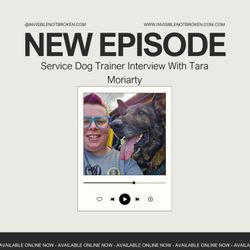
Interview With Service Dog Trainer: Tara Moriarty
45:00|SummaryIn this conversation, Tara Moriarty discusses her journey into the world of service dogs, the challenges of finding and training them, and the importance of understanding their role in supporting individuals with disabilities. The discussion covers the costs associated with obtaining a service dog, the various training methods, and the misconceptions that the public holds about service dogs and their handlers. This conversation delves into the distinctions between service dogs and emotional support animals, emphasizing the legal definitions and roles of each. It explores the challenges faced by service dog owners, including the need for proper training and support systems. The discussion highlights the importance of planning for the future care of service dogs, especially for individuals with degenerative conditions. Additionally, it covers the process of finding the right dog and trainer, advocating for positive reinforcement training methods, and the significance of using food as a motivational tool in dog training.Chapters00:00 Introduction to Service Dogs and Their Importance03:13 The Cost and Accessibility of Service Dogs06:07 The Journey into Dog Training08:52 Understanding Dog Behavior and Training Methods12:06 The Need for Service Dogs: When is it Time?14:59 Choosing the Right Breed for Service Dogs17:45 Public Misconceptions About Service Dogs25:50 Understanding Service Dogs vs. Emotional Support Animals29:08 Navigating the Challenges of Service Dog Ownership31:55 Preparing for a Service Dog: Key Considerations34:22 Finding the Right Dog and Trainer38:53 The Importance of Positive Reinforcement in Training44:57 Innovative Training Techniques and ResourcesTakeawaysService dogs can be very expensive, ranging from $20,000 to $40,000.Nonprofits may offer lower-cost options, but availability is limited.Training a service dog can be a complex and costly process.Understanding dog behavior is crucial for effective training.Positive reinforcement is a more effective training method than punishment.Many people consider getting a service dog too late in their journey.The right breed for a service dog is less important than temperament.Labradors, Goldens, and Poodles are commonly recommended breeds.Public misconceptions about service dogs can lead to challenges for handlers.Emotional support is not a task that qualifies a dog as a service dog. Service dogs are task-trained to mitigate specific disabilities.Emotional support animals provide comfort but lack legal recognition as service animals.It's crucial to have a plan for the care of a service dog as health conditions change.Choosing the right breed is essential for first-time service dog owners.Positive reinforcement is key to effective dog training.Finding a qualified dog trainer can significantly impact training success.Service dog tasks are tailored to individual needs and circumstances.Proper training and socialization are vital for service dogs to function in public.Planning ahead for a service dog's future is necessary for responsible ownership.Using food as a reward can enhance training and strengthen the bond with your dog.Keywordsservice dogs, dog training, psychiatric service dogs, emotional support, dog behavior, training methods, cost of service dogs, choosing a service dog, public misconceptions, service dogs, emotional support animals, training, positive reinforcement, disability, dog ownership, service dog tasks, finding a trainer, dog breeds, service dog laws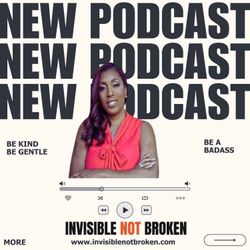
Tisha Foster: Glamour, Motherhood, Faith, and Chronic Illness
53:13|SummaryIn this conversation, Tisha shares her journey of living with chronic illness, emphasizing the importance of gratitude, community support, and the struggles of public perception. She discusses her experiences with autoimmune disorders, the challenges of diagnosis, and how she has reframed her relationship with her illness, focusing on empowerment rather than battle. In this conversation, the speaker shares their experiences of parenting with a disability, discussing the challenges of communicating their condition to their children and the emotional toll it takes on family dynamics. They explore the journey of finding purpose while being bedbound and the therapeutic process of writing a book about their experiences. The discussion emphasizes the importance of support systems, the need for understanding in educational settings, and the resilience required to navigate life with a disability.TakeawaysGratitude can be a powerful tool for coping with chronic illness.Public perception often overlooks the struggles of those with invisible illnesses.Community support plays a crucial role in mental health and resilience.The journey to diagnosis can be long and fraught with challenges.Reframing the narrative around illness can lead to empowerment.It's important to check in on loved ones, even those who seem happy.Sharing personal stories can help others feel less alone.Wearing heels can be a form of self-expression and empowerment.Language matters when discussing illness and identity.Writing can be a therapeutic way to share one's journey. Talking to children about disabilities requires different approaches based on their age.The emotional impact of a parent's illness can lead to complex family dynamics.Creating a game out of challenges can help children cope with difficult situations.Parents often feel guilt for not being able to participate in typical activities with their children.Support from family and friends is crucial when dealing with chronic illness.Living with a disability can lead to feelings of isolation and despair.Finding purpose and joy in life, even from bed, is possible.Writing about personal experiences can be a healing process.It's important to advocate for accessibility in schools and public spaces.Resilience and community support are key to thriving despite adversity.Keywordsgratitude, chronic illness, public perception, diagnosis journey, living with illness, mental health, autoimmune disorders, personal stories, resilience, community support, disability, parenting, mental health, communication, writing, resilience, family dynamics, bedbound life, emotional support, personal journey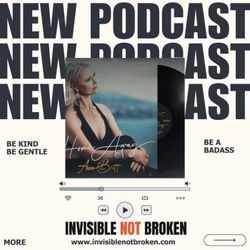
Musician Ann-Britt Celebrating New Music, Creativity and Chronic Illness, and Creating New Goals
53:21|SummaryIn this conversation, Monica Michelle and Ann-Britt discuss their shared experiences with chronic illness, particularly Ehlers-Danlos syndrome. They explore the challenges of living with a chronic condition, the importance of community support, and the therapeutic role of music in coping with illness. Ann-Britt shares her journey from being an active musician to adapting her life around her health challenges, including the use of a wheelchair. They also touch on the differences in healthcare systems between Denmark and the USA, emphasizing the need for better understanding and support for those with chronic illnesses. In this conversation, Monica Michelle and Ann-Britt discuss the challenges of traveling with a disability, the emotional journey of adapting to life changes due to chronic illness, and the importance of setting boundaries. They explore generational differences in self-care, the concept of diminished normalcy, and the emotional ties to home. Ann-Britt shares her musical inspirations and the themes of her upcoming album, highlighting the beauty in small moments and the power of creativity in the face of adversity.Keywordschronic illness, Ehlers-Danlos syndrome, mental health, creativity, music therapy, wheelchair use, healthcare systems, Denmark, USA, community support, chronic illness, accessibility, self-care, personal growth, music, life changes, boundaries, emotional health, travel experiences, generational differences
Author of “Finding A New Normal: Living Your Best Life with Chronic Illness”: Suzan Jackson
49:39|Monica Michelle is joined by author Sue Jackson.Sue lives with Myalgic encephalomyelitis/chronic fatigue syndrome (ME/CFS) and Lyme disease.In this episode, Monica and Sue discuss: Sue’s pathway to diagnosis Parenting with chronic illness and parenting a child with chronic illnessManaging ME/CFS from diagnosis to creating routinesUsing books to cope emotionallyWriting a book while having chronic fatigueTIMESTAMPS00:46 Sue’s diagnosis and how she manages her symptoms 13:03 Parenting with a chronic illness25:02 COVID-19’s impact on chronic illness 30:35 Books as a form of escapism and connection42:00 The challenges of writing and the importance of routines with chronic illness The full transcript and all links mentioned can be found on the episode page on invisiblenotbroken.com
Using Self-Portraits to Represent Chronic Pain
01:00:29|Monica Michelle is joined by artist Kyrianna Bolles.Kyrianna lives with chronic pain.In this episode, Monica and Kyrianna discuss: Kyrianna’s struggle to be accommodated for her pain throughout school yearsHow Kyrianna uses her portraits to help represent other’s chronic conditionsThe communities Kyrianna has built, from a college support group to an artist collectiveKyrianna’s favorite tools for art and chronic painTIMESTAMPS00:00 Intro to Kyrianna 10:45 Kyrianna’s self portraits 24:42 Kyrianna’s Support group 33:40 Animus45:57 Kyriannas favorite support tools The full transcript and all links mentioned can be found on the episode page on invisiblenotbroken.com